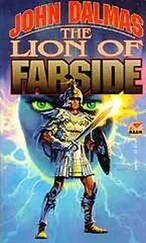John Dalmas - The Yngling
Здесь есть возможность читать онлайн «John Dalmas - The Yngling» весь текст электронной книги совершенно бесплатно (целиком полную версию без сокращений). В некоторых случаях можно слушать аудио, скачать через торрент в формате fb2 и присутствует краткое содержание. Жанр: Фэнтези, на английском языке. Описание произведения, (предисловие) а так же отзывы посетителей доступны на портале библиотеки ЛибКат.
- Название:The Yngling
- Автор:
- Жанр:
- Год:неизвестен
- ISBN:нет данных
- Рейтинг книги:5 / 5. Голосов: 1
-
Избранное:Добавить в избранное
- Отзывы:
-
Ваша оценка:
- 100
- 1
- 2
- 3
- 4
- 5
The Yngling: краткое содержание, описание и аннотация
Предлагаем к чтению аннотацию, описание, краткое содержание или предисловие (зависит от того, что написал сам автор книги «The Yngling»). Если вы не нашли необходимую информацию о книге — напишите в комментариях, мы постараемся отыскать её.
The Yngling — читать онлайн бесплатно полную книгу (весь текст) целиком
Ниже представлен текст книги, разбитый по страницам. Система сохранения места последней прочитанной страницы, позволяет с удобством читать онлайн бесплатно книгу «The Yngling», без необходимости каждый раз заново искать на чём Вы остановились. Поставьте закладку, и сможете в любой момент перейти на страницу, на которой закончили чтение.
Интервал:
Закладка:
Big flakes of snow began to come with the rain.
Near the east end of the clearing, above the high bank of a river, was Hovdingeby, which also was called Vargby because it was the original home of the Wolf Clan and its major village. The long-house there measured thirty meters, and many men could sleep in its steep-roofed loft. Its logs had been squared with broad ax and adze so that they fitted almost perfectly, and even the stones of its smoking chimneys had been squared. At each end the ridgepole thrust out three meters beyond the overhanging roof, curving upward, scrolled and bearing the carven likeness of a wolf. Hides covered its windows, scraped thin to pass more light, but on the westward side the shutters were closed against the rain.
The two warriors walked up its split-log steps and scraped their muddy feet on the stoop. One rapped sharply on the plank door with the hilt of his knife, and a stout thrall woman let them in. It was cold and gloomy in the entry room. Though Svear, the two warriors were not of the Wolf Clan, so they waited there with the silence of men who had nothing new to say to each other and were disinclined to talk for the sake of breaking silence. Shortly a tall old man, Axel Stornave himself, came out to them wearing a loose cloak of white hare skins. "You are the last to arrive," he said. "I'm sorry my messenger took so long to find you." The hands that gripped could have crushed necks.
"We are often gone from our homes," one answered. "Reindeer are not cattle. The herds must range far for forage."
The old man ushered them into the hall. "We have dry clothes for you," he said. "I'll have food warmed, and the stones are hot in the bath house. When you have bathed and eaten, I suggest you rest. We will meet together at the evening meal, and it may be late before the talking ends."
The men at the evening meal were the chiefs of the three tribes, with their counselors, and the clan chieftains of the Svear, each with his lieutenant. They ate roast pig, that most savory of flesh, smoked salmon, and blood pudding thickened with barley and sweetened with honey that had found its way there from southern Jotmark. And there was fermented milk, and ale, but no brannvin, for these men were sometimes enemies who had put aside their feuds to meet together. Axel Stornave did not want the blood to run too warm in their veins.
When the platters were taken away, Stornave rose, the oldest man of them, and they all listened, for warriors and raid leaders did not live as long as he had without skill and luck and cunning.
"Some in my clan," he said, "and in all the clans of the Svear, have talked in recent years of leaving our land. They have heard of lands where the summers are longer and warmer. And I have heard it is the same among the Jotar and Norskar." He turned toward the bull-like form of Tjur Blodyxa, chief of the Jotar. "I have heard that in Jotmark the Sea Eagle Clan began last summer to build large boats, ships in which to send strong war parties to find a better land. It was also told at the last ting of the Svear"-here he turned grimly to Jaavklo of the Gluttons-"that our own northern clans whisper of breaking the bans and trying to take away land from the clans to the south, unless we willingly make room for them.
"And now we have had this winter unlike any before, and our people wonder if we can make a crop. We have had to kill many cattle, poor in flesh, because the hay barns were becoming empty, and it's better to kill some than lose all. But we have butchered the seed, so calves will be few. And we cannot live on wild flesh, for there are too many of us." He paused and looked around at the faces turned toward him. "So I believe the Sea Eagles have the right idea," he went on. "The time has come to leave.
"But the lands to the south are peopled already. We have all heard wanderers who have been to some of them. A wanderer of your Otter Clan"-he turned again to Tjur Blodyxa-"has told us stories in this very longhouse of the Daneland where he had lived, where the clearings are greater than the forests, and the warriors have high stone walls to protect them. And when I questioned him he said that in the Daneland, too, people complained that the winters were growing longer and harder.
"And from your Seal Clan"-he turned to Isbjorn Hjelteson, chief of the Norskar-"a wanderer told us of the Frisland, south across the sea, where the people speak a tongue he could not understand, where there are few trees, and the pastures and haylands are so wide a man can't see across them. There they complain that each year they must build their haystacks bigger and haul more wood from the distant forests.
"Is the whole world freezing? Or are there really lands where the summers are long and warm? We all have heard rumors of them. But how does one come to such lands? There is one man of the Wolf Clan who may be the greatest traveler of all. Last fall he returned from four years of absence, telling tales of the lands he had visited. He is Sten Vannaren; you can talk to him later and ask him questions. He brought with him what you see on this wall." The old chief turned and pulled a bearskin from the pegs on which it had hung, exposing a map of Europe. "This is a map the craft of whose makers far exceeds ours. It is said to be a copy of a map of the ancients and is made on a stuff called linen. North is at the top, as on the maps we make ourselves. Here"-his big finger circled-"are the lands of the tribes. The blue is the sea."
Axel Stornave looked around the table. All eyes were on the marvel before them, so he continued talking and pointing. "Sten journeyed across several lands and finally came to this southern sea. And he found that what we had believed is actually true: that as you continue southward the sun gets nearer and higher and the climate warmer. The lands around that sea are never cold except high in the mountains, and even in the heart of winter the snows lie on the ground for only a few days at a time, or a few weeks at worst.
"It is a land where the clans could be happy.
"There are two ways to reach that land. One is by sea." He traced a route from the Skagerrak across the North Sea, southward along the Atlantic coast and through Gibraltar. Grim eyes watched. "Although perhaps we would not have to go that far. This might serve as well." He pointed to the coast along the Bay of Biscay. "But if every fishing boat left filled with warriors, they still would be too few. By the time the boats could make a second trip, those few would be dead at the hands of the tribes who live there now.
"The second way is across the land, after boats have made the short trip here." He ran his finger along the shores south of the Baltic. "The tribes of each land we entered would fight, of course, and their people are very numerous, so there are many of them for each one of us. In some of those lands the chiefs hire foreigners in their armies, so Sten never went hungry for food or fight. And their warriors, which they call knights, are less skilled with weapons than we. Also, their warriors do not care to go on foot. If they must go into battle on foot, they prefer to delay. He even found some who would hardly be able to fight after a day's march. Do not be mistaken. They have fierce men, men not afraid to die"-here the old chief paused for effect, then spoke slowly and clearly-"but never did he find any knight who was a match for one of our warriors.
"Even so, if the Sea Eagle Clan landed here"-he pointed to northern Poland-"at the nearest place to their homeland, and started south, the knights of that district would attack them on horseback and kill many. And the chief of that land would gather a strong army, of many hundreds, and attack until no man of the Sea Eagles was left alive, they would be so outnumbered. And what then of their women and children and the spirits of their dead?
Читать дальшеИнтервал:
Закладка:
Похожие книги на «The Yngling»
Представляем Вашему вниманию похожие книги на «The Yngling» списком для выбора. Мы отобрали схожую по названию и смыслу литературу в надежде предоставить читателям больше вариантов отыскать новые, интересные, ещё непрочитанные произведения.
Обсуждение, отзывы о книге «The Yngling» и просто собственные мнения читателей. Оставьте ваши комментарии, напишите, что Вы думаете о произведении, его смысле или главных героях. Укажите что конкретно понравилось, а что нет, и почему Вы так считаете.








